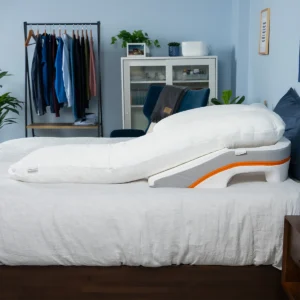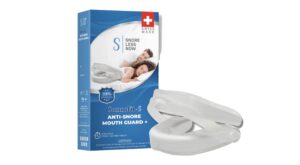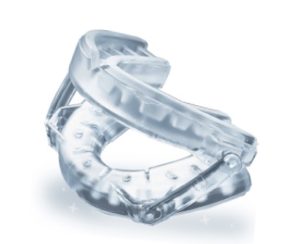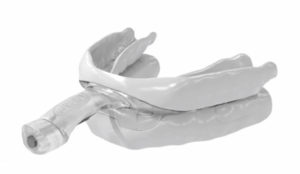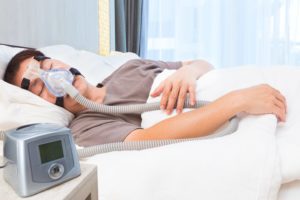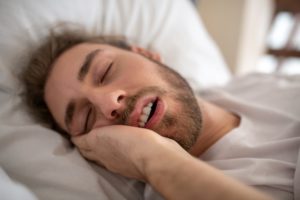When you buy through our links, we may earn a commission. Products or services may be offered by an affiliated entity. Learn more.
What Causes Snoring in Women?
- Snoring in women can be influenced by hormonal changes, weight gain, allergies, lifestyle, and underlying medical conditions.
- Identifying the specific cause of snoring is crucial for finding the most effective treatment.
- Snoring becomes more common with age and is usually harmless.
- If snoring is persistent, consult with a healthcare professional to address any underlying health concerns.
Snoring is caused by tissues in the airway vibrating as a sleeper breathes. Although snoring affects people of any sex or gender, several unique factors contribute to snoring in women and people assigned female at birth.
Women have historically been underrepresented in medical research, including research related to snoring. However, studies have begun to uncover how female sex hormones may affect a person’s risk of snoring, as well as how gender may play a role in how likely a person is to report this nighttime symptom. We discuss conditions that increase the risk of snoring and how to reduce or prevent snoring.
Causes of Snoring in Women
Certain risk factors for snoring, such as pregnancy and menopause , are unique to women and people assigned female at birth. Other common causes of snoring such as nasal congestion, hypothyroidism, obesity, and certain anatomical traits may occur in people of any sex or gender.
Pregnancy
Experts estimate that as many as half of pregnant people snore . Snoring typically gets worse as pregnancy develops, especially during the third trimester . After giving birth, most people experience a rapid reduction in snoring. Changing hormones, weight gain, and swollen nasal passages can all contribute to snoring during pregnancy.
Menopause
Snoring increases during and after menopause This could be due to a decrease in estrogen and progesterone , hormones that may be protective against snoring. After menopause, women also commonly gain weight, increasing their risk of obesity and breathing changes during sleep.
Overweight and Obesity
People who have overweight or obesity are more likely to snore, as excess tissue in the neck, throat, and tongue can make the airway more likely to collapse during sleep. Obesity can also decrease the volume of a person’s lungs and interfere with the function of muscles involved in breathing.
Nasal Congestion and Other Issues in the Nose
Snoring can also be triggered when the nasal passages are blocked or become too narrow. Conditions that affect the nasal passages and contribute to snoring include nasal congestion due to a cold, allergies or sinusitis , surgery on the sinuses, issues with the nasal septum, and abnormal growths inside the nasal cavity.
Smoking, Alcohol, and Sedatives
Several medications and other substances can increase the likelihood that a person will snore. For example, drinking alcohol can increase snoring, which may be due to alcohol’s effect on the muscles of the upper airway. Smoking may also exacerbate snoring, potentially due to increased nasal congestion or short-term nicotine withdrawal from not smoking during the night.
Medications that may increase the risk of snoring include:
- Benzodiazepines
- Antihistamines
- Antiepileptic medications
- Certain antidepressants
- Opiates
Hypothyroidism
Hypothyroidism can narrow a person’s breathing passages and make it more likely that they will snore. Hypothyroidism occurs when the thyroid does not produce sufficient thyroid hormones , which affect the function of organs throughout the body. Hypothyroidism is more common in women, people assigned female at birth, and those who are or have recently been pregnant.
Is Your Snoring a Health Risk?
Answer three questions to understand if you should be concerned.
Obstructive Sleep Apnea
Snoring can also be a symptom of obstructive sleep apnea (OSA), a condition in which a person’s airway narrows and significantly affects their breathing during the night. While snoring alone does not typically affect breathing or wake a person up from sleep, OSA can lead to nighttime awakenings and increase the risk of long-term health consequences.
In the past, doctors considered obstructive sleep apnea to be a condition that primarily affected men . However, research now suggests that OSA is often missed in women and people assigned female at birth and that as many as 93% of women with OSA are undiagnosed.
Researchers have proposed several explanations for this, including that women may experience different symptoms, are less likely to tell their doctor about snoring, or tend to have bed partners who are less observant.
Is Snoring Normal?
Nearly everyone snores on occasion, and people are more likely to snore as they get older. Research suggests that approximately 28% of adult women snore regularly.
Although many women and people assigned female at birth snore, experts suggest that women are less likely to admit to snoring , perhaps because snoring has traditionally been seen as a masculine behavior.
Because snoring only occurs when a person is asleep, people who snore may not be aware of it, especially if they sleep alone. On its own, snoring is often harmless and may not require medical treatment unless it is disruptive to the sleeper or their bed partner.
However, people who snore regularly should talk to their doctors, especially if they have symptoms of obstructive sleep apnea like very loud snoring, pauses in breathing during sleep, headaches, or excessive tiredness during the day.
How to Reduce or Prevent Snoring
Many women want to know how to stop snoring. Depending on the cause, interventions that may reduce or stop snoring include changing the sleep position, reducing weight, cutting back on tobacco and alcohol, and using devices or medications to open the airway.
Avoid Smoking, Alcohol, and Sedatives
Cutting back on smoking and alcohol use, particularly in the leadup to bedtime, may reduce or stop snoring. If the medications a person takes contribute to snoring, they can talk to their doctor about changing their dose or finding another medication.
Treat Nasal Congestion
Doctors may recommend a decongestant, a nightly saline nose rinse, or other treatments to reduce snoring caused by nasal congestion. It may be helpful to work with a doctor when using decongestants to reduce snoring, as some medications can increase nasal congestion if they are used for too long.
Avoid Back Sleeping
Some people snore less when sleeping on their side or elevated on a wedge pillow. To encourage side sleeping, people can try sewing a tennis ball into the back of a t-shirt to prevent rolling onto their back during the night.
Various other devices are marketed to help encourage side sleeping and keep a person’s airway open, such as nightshirts, posture alarms, and special pillows. More research will be needed to establish whether these devices improve snoring.
Get Regular Exercise
If a doctor determines that weight is contributing to snoring, regular exercise may help. Among other benefits of exercise, losing weight can improve muscle function and reduce excess tissue in the mouth and neck to ease pressure on the airway.
Try a Nasal Dilator
If other methods are not effective, a doctor may recommend trying a nasal dilator. Nasal dilators are wearable devices that help to keep the nasal passages open by widening the nose from within or come as adhesive nasal strips that can be placed across the outside of the nostrils.
Get Fitted for an Oral Appliance
In some cases, a doctor may recommend a customized oral device, also called a snoring mouthpiece or mouthguard. Unlike bite guards used for teeth grinding, these devices are typically custom-fitted by a dentist. They may shift the jaw or tongue forward, or they may change the positioning of tissues to keep the airway open.
Use a Positive Airway Pressure (PAP) Device
Although this therapy is usually reserved for people with obstructive sleep apnea, doctors may prescribe continuous positive airway pressure (CPAP) to address bothersome snoring. A CPAP machine delivers pressurized air through a face mask to prevent the airway from collapsing during sleep.
Talk to a Doctor
Because a variety of factors can contribute to snoring, the first step to addressing bothersome snoring is to contact a doctor. A doctor can help by assessing a person’s symptoms, recommending treatments, and discussing whether it may be helpful to test for obstructive sleep apnea or other health conditions that can contribute to snoring.

Still have questions? Ask our community!
Join our Sleep Care Community — a trusted hub of sleep health professionals, product specialists, and people just like you. Whether you need expert sleep advice for your insomnia or you’re searching for the perfect mattress, we’ve got you covered. Get personalized guidance from the experts who know sleep best.
References
13 Sources
-
Schwab, R. J. (2022, May). Snoring. Merck Manual Professional Version.
https://www.merckmanuals.com/en-pr/professional/neurologic-disorders/sleep-and-wakefulness-disorders/snoring -
Louis, J., & Pien, G. W. (2022, November 28). Obstructive sleep apnea in pregnancy. In V. Berghella, & N. Collop (Eds.). UpToDate.
https://www.uptodate.com/contents/obstructive-sleep-apnea-in-pregnancy -
Lui, K. T., Kimoff, R. J., Panyarath, P., & Pamidi, S. (2022). Persistence and prevalence of sleep-disordered breathing after delivery: A scoping review of longitudinal and cross-sectional studies. Sleep Medicine Reviews, 65, 101674.
https://pubmed.ncbi.nlm.nih.gov/36209649/ -
Zhou, Y., Liu, F., Li, C., Zheng, Y., Hu, J., Zhou, Y., Geng, L., Jiang, S., Teng, Y., & Tao, M. (2020). Association of snoring and body composition in (peri-post) menopausal women. BMC Women’s Health, 20(1), 175.
https://pubmed.ncbi.nlm.nih.gov/32791966/ -
Yuan, Y., Zhang, F., Qiu, J., Chen, L., Xiao, M., Tang, W., Luo, Q., Ding, X., & Tang, X. (2022). Association between snoring and diabetes among pre- and postmenopausal women. International Journal of General Medicine, 15, 2491–2499.
https://pubmed.ncbi.nlm.nih.gov/35282647/ -
Badr, M. S. (2022, April 15). Pathophysiology of upper airway obstruction in obstructive sleep apnea in adults. In G. Finlay (Ed.). UpToDate.
https://www.uptodate.com/contents/pathophysiology-of-upper-airway-obstruction-in-obstructive-sleep-apnea-in-adults -
Rowley, J. A. (2023, January 6). Snoring in adults. In M. S. Badr (Ed.). UpToDate.
https://www.uptodate.com/contents/snoring-in-adults -
Kryger, M. H., & Malhorta, A. (2022, August 11). Management of obstructive sleep apnea in adults. In N. Collop (Ed.). UpToDate.
https://www.uptodate.com/contents/obstructive-sleep-apnea-overview-of-management-in-adults -
National Institute of Diabetes and Digestive and Kidney Diseases. (2021, March). Hypothyroidism (Underactive thyroid).
https://www.niddk.nih.gov/health-information/endocrine-diseases/hypothyroidism -
Orbea, C. A. P., Lloyd, R. M., Faubion, S. S., Miller, V. M., Mara, K. C., & Kapoor, E. (2020). Predictive ability and reliability of the STOP-BANG questionnaire in screening for obstructive sleep apnea in midlife women. Maturitas, 135, 1–5.
https://pubmed.ncbi.nlm.nih.gov/32252960/ -
Mallampalli, M. P., & Carter, C. L. (2014). Exploring sex and gender differences in sleep health: a Society for Women’s Health Research Report. Journal of women’s health (2002), 23(7), 553–562.
https://pubmed.ncbi.nlm.nih.gov/24956068/ -
Westreich, R., Gozlan-Talmor, A., Geva-Robinson, S., Schlaeffer-Yosef, T., Slutsky, T., Chen-Hendel, E., Braiman, D., Sherf, Y., Arotsker, N., Abu-Fraiha, Y., Waldman-Radinsky, L., & Maimon, N. (2019). The presence of snoring as well as its intensity is underreported by women. Journal of Clinical Sleep Medicine, 15(3), 471–476.
https://pubmed.ncbi.nlm.nih.gov/30853036/ -
Cowan, D. C., & Livingston, E. (2012). Obstructive sleep apnoea syndrome and weight loss: review. Sleep disorders, 2012, 163296.
https://pubmed.ncbi.nlm.nih.gov/23471145/





